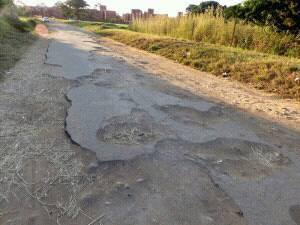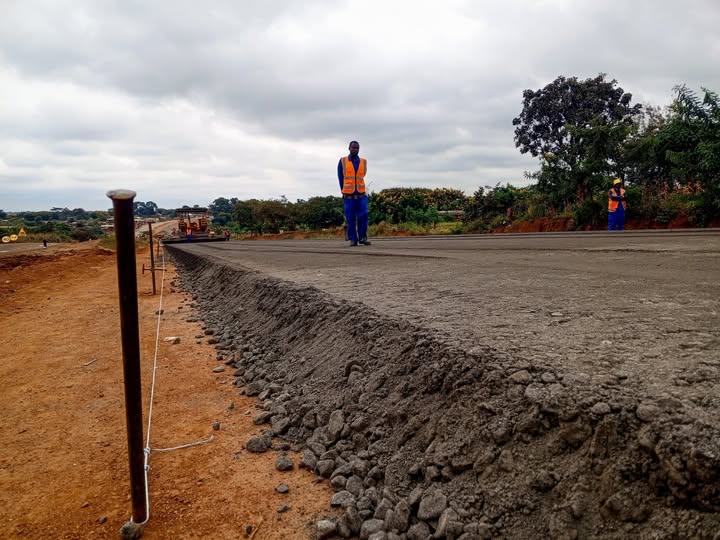The Lilongwe City Council has announced that construction works on the deteriorated Chipasula–Area 23 Road within the city will commence this Tuesday, May 12, 2025 — marking a fresh chapter in a troubling tale of substandard infrastructure, corruption and negligence in public construction projects.
The 2.5-kilometre road re-opened in 2017 following an upgrade to bitumen standard and celebrated as a symbol of urban development during the Democratic Progressive Party (DPP), is now a cautionary example of how corruption and poor-quality control undermine national progress. Just under five years after it was upgraded at a cost of K2.5 billion, the road fell into disrepair, eventually becoming completely impassable.

This is part of Chipasula-Area 23 Road opened in 2017 after an upgrade by the DPP Administration
“This road should never have fallen apart so soon. Its current state is unacceptable and symptomatic of the deeper issues facing public infrastructure management,” observed Julius Tsogolani, Director of Public Works at the Lilongwe City Council.
The new rehabilitation, to be executed by Solid Construction Company at an estimated cost of K2 billion for the first phase, will cover one kilometre and is expected to be completed within four months. The scope and budget for the second phase are still under review.
While authorities frame this as a new beginning, residents and observers are questioning why a road that was rebuilt just a few years ago already needs a full rehabilitation. Political and engineering analysts argue that the answer lies in the corrupt practices that characterized the DPP rule under Arthur Peter Mutharika.
The road stretch, vital to thousands of residents and commuters in the capital city, has now become a symbol of wasted resources and failed governance.
In 2017, the DPP saw the upgrading of the road under the Lilongwe City Council’s Phase II road improvement initiative.
The project aimed to modernize major city roads, including the Biwi–Chipasula–Area 23 route. It was expected to enhance mobility, stimulate local business, and improve urban transport standards. Instead, what followed was a disastrous sequence of poor execution, political interference, and lack of oversight, leading to the road’s complete deterioration. By 2022, the road was gone.
Initially, the Chipasula–Area 23 road project was met with public enthusiasm. The stretch connected vital residential areas with business hubs, making it a strategic artery for both personal and commercial transit. Plem Construction was involved in this stretch.
According to Lilongwe City Council officials at the time, all projects were expected to follow standard procedures and be completed to international engineering standards. However, cracks — both literal and figurative — began to appear early on.
Within months of completion, residents began noticing irregularities potholes, damaged drainage system, and surface crumbling. Investigations revealed that the road had been surfaced with a cheaper cape seal and slurry method, instead of the more durable asphalt paving used in other cities like Mzuzu and Blantyre.
Engineer Mohan Krishnan of Plem Construction acknowledged that the road was constructed “according to contract specifications” — specifications that allowed lower-quality materials.
This admission is critical and raises vital questions especially considering what the Roads Fund Administration (RFA) said that there was little value for the money spent. The RFA expressed disappointment, labeling several roads under the project as “substandard” and citing poor oversight.
On the other hand, Plem Construction said contractors did not necessarily break contractual terms, the terms themselves were flawed and likely designed to cut costs in ways that compromised durability. The vital question would be who authorized such cut of costs when the RFA seems to suggest that funds were available to ensure a good and standard job was done.
Corruption in public works projects in Malawi is a well-documented problem. Analysts argue that political interference was a major factor in the road’s poor construction. During the DPP era, multiple infrastructure projects were used as political tools to siphon funds and reward loyalists.
There is credible information that some ruling party officials demanded a cut from the total construction budget, thereby forcing contractors to find savings elsewhere — typically by cutting corners in material and workmanship.
This system incentivized short-term performance and disincentivised sustainability. The result? Roads that barely lasted a few rainy seasons with the corrupt officials having no powers to question anything as they were very well aware where the money went.
In the case of Chipasula–Area 23, the cost of such corruption is now being felt by taxpayers and commuters. Instead of a road that could have lasted 15 to 20 years with proper planning and execution, the city is now forced to rebuild it entirely — less than a decade later — at almost the same cost.
The newly announced rehabilitation project, awarded to Solid Construction Company, is projected to cost about K2 billion for just the first kilometre — nearly equivalent to the original cost of building the entire 2.5-kilometre stretch.
Tsogolani, confirmed that phase one of the project would take four months, while phase two’s scope and cost are still under review. If current estimates hold, rebuilding the entire road could cost more than K5 billion — doubling the original expense.
What this means is that Malawian taxpayers are essentially paying twice for a service that should have been delivered right the first time. For a country facing multiple development challenges, this is not just an economic waste — it is a moral and political failure.
What is more worrisome, despite the glaring failures of the 2017 project, there has been no public audit, legal accountability, or even official inquiry into what went wrong.
The contractors blamed the specifications, the council blamed funding shortages despite the RFA disputing this fact, and the DPP administration remained largely silent. This lack of accountability brings a sour reminder of what DPP was all about: government contracts could be mismanaged with impunity.
It also highlights a broader issue on how the whole government system and governance framework were captured by the DPP regime, leading to weak institutions that lacked independence and power to hold decision-makers accountable. We still had the Office of the Auditor General, the Anti-Corruption Bureau (ACB), and the Parliamentary Public Accounts Committee which were all mute without the will to proactively deal with such cases. Billions continued to leak through the cracks of corruption.
Unfortunately, the Chipasula–Area 23 road is not an isolated case. Across the country, similar tales of poorly constructed roads, ghost projects, and cost inflation were common during the DPP administration under Arthur Peter Mutharika.
In economic terms, Malawi cannot afford to come back to that era and continue to throw away billions on short-lived infrastructure. Development is not just about building — it is about building right.

The standards of road being constructed by the administration of President Dr Lazarus McCarthy Chakwera
It is a relief for the past five years since the Malawi Congress Party (MCP) came into power with the leadership of President Dr. Lazarus McCarthy Chakwera, projects that have done have shown a level of high quality and durable standard. The good example is the network of road that have been done within Blantyre City, one can see that the roads are there to last and not just for day or one election circle.
The story of the Chipasula–Area 23 road is a costly reminder of how damaging has been the reign of the DPP and Arthur Peter Mutharika. It is a reminder that DPP’s corruption, DPP’s weak oversight, and DPP’s political interference in public works were not abstract problems, they have real consequences for ordinary people.








